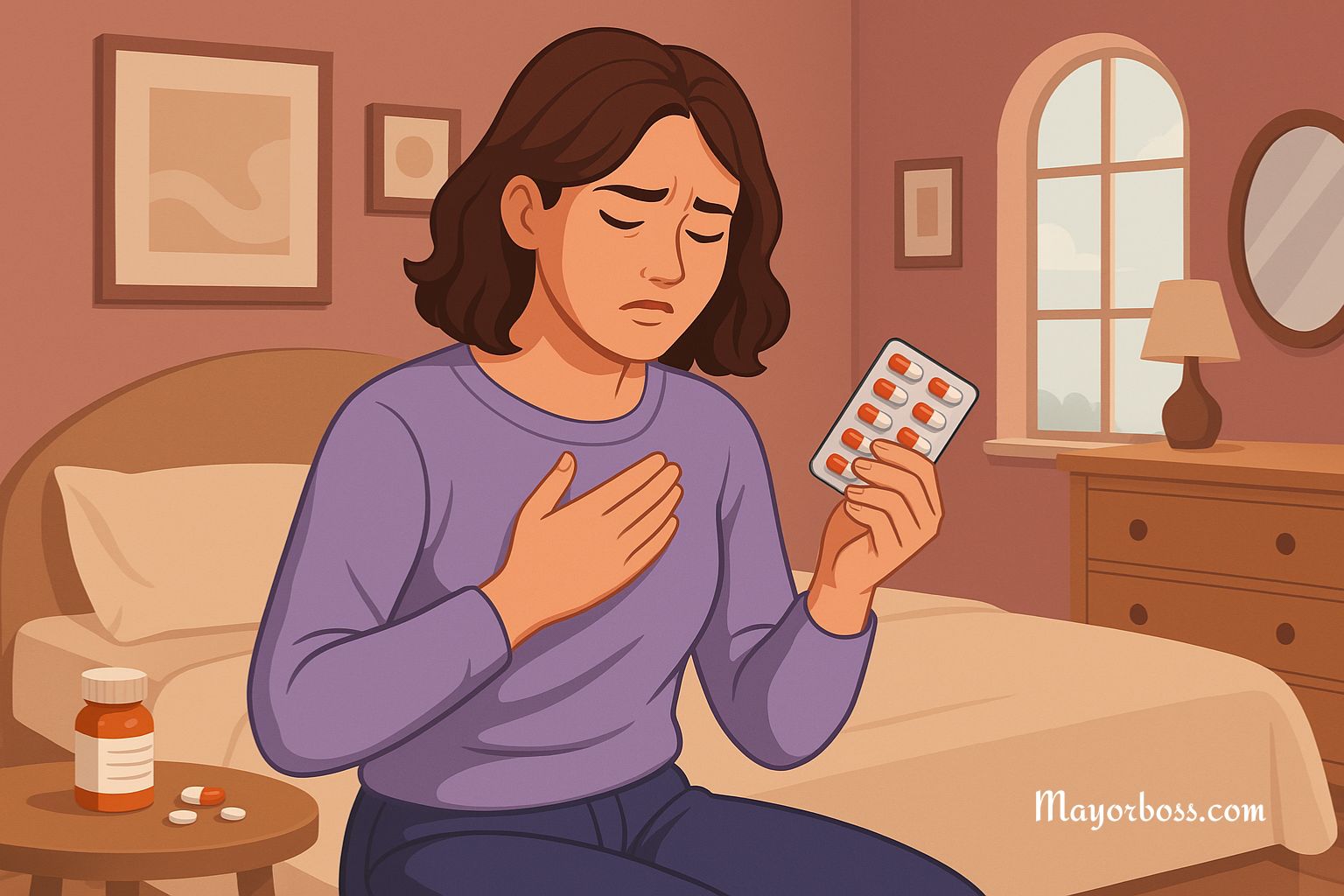10 Side Effects of Common Medications—Don’t Ignore These!
Medications help manage pain, treat illness, and support long-term health. But some can cause side effects, also known as adverse reactions, that should never be ignored. These side effects can be serious and, in some cases, life-threatening.1 Here are some medication side effects that deserve immediate attention—along with the types of drugs that may cause them.

1. Chest pain
Chest pain doesn’t signal a heart attack. Still, it’s not something you should ignore. If chest pain persists while you’re taking certain medications, it could be a sign of heart strain or increased risk of a heart attack—especially if you have a history of heart conditions. Examples of medications associated with chest pain include:2
- Nonsteroidal anti-inflammatory drugs (NSAIDs)
- Triptans such as sumatriptan (Imitrex)
- Stimulants such as amphetamine/dextroamphetamine (Adderall)
- Hormonal birth control pills with estrogen, like Yasmin or Ortho Tri-Cyclen
2. Shortness of breath
Feeling winded from climbing stairs is one thing. But if you suddenly struggle to breathe—even while resting—it could be a reaction to medication.
Certain drugs can affect your lungs or heart or cause swelling that limits airflow. This side effect may need urgent treatment. Medications known for this include:
- Amiodarone – for heart rhythm problems
- Methotrexate – used for cancer and autoimmune diseases
- Beta-blockers such as metoprolol
- NSAIDs like ibuprofen – can cause fluid retention
- Chemotherapy drugs including bleomycin
3. Vision changes
Blurry vision, difficulty focusing, or seeing halos around lights may seem like normal aging—but some medications can interfere with how your eyes work.
These changes can happen suddenly and may signal increased eye pressure or nerve damage. Some medications to watch for include:
- Corticosteroids like prednisone
- Anti-seizure drugs such as topiramate (Topamax)
- Hydroxychloroquine (Plaquenil) – for lupus or rheumatoid arthritis
- Antihistamines like diphenhydramine (Benadryl)
4. Confusion or memory problems
If you start feeling mentally foggy, forgetful, or confused, it may not be just stress or aging. Some drugs affect how your brain processes information.
Older adults are especially at risk, but anyone can experience this side effect. Some examples include:
- Benzodiazepines like diazepam (Valium) or lorazepam (Ativan)
- Antihistamines such as diphenhydramine (Benadryl)
- Opioid painkillers like oxycodone or morphine
- Tricyclic antidepressants like amitriptyline
5. Severe dizziness or fainting
Dizziness can be mild, but when it’s intense or leads to fainting, it could mean a medication is lowering your blood pressure too much.
This can reduce blood flow to your brain and may become dangerous. Drugs linked to this side effect include:
- ACE inhibitors such as lisinopril or enalapril
- Diuretics like furosemide (Lasix)
- Alpha-blockers like tamsulosin (Flomax)
- Nitroglycerin – used for chest pain
6. Unusual bleeding or bruising
If you notice you’re bruising easily or bleeding more than usual, your medication may be interfering with how your blood clots.
This can be serious, especially with medications that thin the blood. Common examples include: 3
- Warfarin (Coumadin) – blood thinner
- Clopidogrel (Plavix) – prevents blood clots
- Aspirin – daily low-dose or full strength
- Heparin – usually given by injection
7. Swelling in the face, lips, or tongue
Sudden swelling, especially around the face or throat, can be a sign of a severe allergic reaction called angioedema.
This reaction can block your airway and become life-threatening if not treated quickly. Some medications that may cause this include:
- ACE inhibitors like lisinopril and ramipril
- ARBs such as losartan and valsartan
- Penicillin antibiotics
- Anti-inflammatory drugs like celecoxib (Celebrex)
8. Yellowing of the skin or eyes
If your skin or the whites of your eyes look yellow, that’s called jaundice. It may be a warning sign of liver damage.
Several drugs can affect liver function, especially in high doses or when combined with alcohol. Be cautious with medications such as:
- Acetaminophen (Tylenol) – especially in large or frequent doses
- Isoniazid – for tuberculosis
- Cholesterol-lowering statins like atorvastatin and simvastatin
- Augmentin – a combination antibiotic
9. Rapid or irregular heartbeat
If your heart suddenly feels like it’s racing or fluttering, this may be a drug-induced change in rhythm.
This side effect is sometimes harmless but can also lead to serious complications. Medications that may cause this include:
- Inhalers like albuterol – for asthma
- Decongestants such as pseudoephedrine
- Antidepressants like citalopram (Celexa)
- Antipsychotics such as haloperidol
10. Severe skin reactions
Painful rashes, peeling skin, or blisters may be signs of a rare but serious condition called Stevens-Johnson syndrome or toxic epidermal necrolysis.
This is a medical emergency and often begins with flu-like symptoms. Drugs known to trigger it include:
- Anti-seizure medications like lamotrigine (Lamictal) and phenytoin
- Antibiotics such as sulfamethoxazole/trimethoprim (Bactrim)
- Allopurinol – used for gout
- Certain NSAIDs
When to Seek Medical Help
Always take new symptoms seriously, especially after starting a new medication. Contact your healthcare provider if you experience any of these side effects. In many cases, adjusting the dose or switching medications can resolve the issue.
But never stop a medication without your doctor’s or pharmacist’s guidance. Some drugs require a slow taper or replacement. Ask your doctor or pharmacist about possible side effects and what to watch for.
